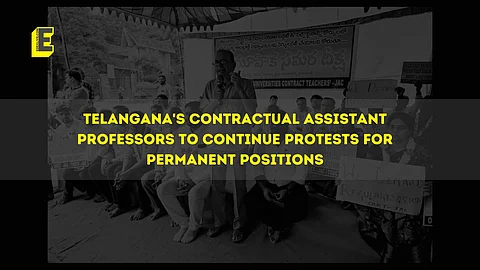

Samuhika Samara Deeksha — this is what the Contractual Assistant Professors named their mass hunger strike organised on Sunday, August 20, at the Dharna Chowk, at Indira Park in Hyderabad. The congregation was presided by eminent educationist, former Professor G Haragopal, who is also a distinguished political scientist (retired) from Hyderabad Central University (HCU), and Member of Parliament (MP) from Rajya Sabha of YSR Congress Party, R Krishnaiah.
The name given to their initiative loosely translates to ‘A War of the Masses’, and the fight that these academicians and educators, who are currently working at 12 universities in the state of Telangana, have waged is for their well-deserved rights, that is, to retain a permanent position in the universities where some of them have been teaching for more than 25-30 years, with added responsibilities bestowed on them sans the benefits.
What did the meeting address?
During the meeting, the presiding speakers spoke of the economic and financial deprivation that these public universities are being subjected to and the alleged intentional dilution of their importance so as to give major backing to the new budding private universities in the state.
A spokesperson also informed people regarding the alleged profiteering motive of a few politicians who gain largely from the growth of such privately owned universities.
“We have been fighting for the regulation for the past six months, but the politicians have been iterating the same thing that they would turn our demands into regulation as soon as possible but so far, there has been no response,” says Dr E Upender Rao, the Telangana State Universities Contract Teachers JAC (Joint Action Committee) Chairman, Osmania University.
The public universities in Telangana are in a state of degeneration as they suffer from redundant regulations and inefficacy in their daily functioning, says Dr Rao. He also explained how the process of hiring contractual teachers began.
How it started versus how it is going
“The genesis of this idea came from Chandrababu Naidu, the former-Chief Minister of United Andhra Pradesh. It first began with recruiting ad-hoc professors, who only served at the institutions for a definite time period. Later on, contractual teachers were introduced, who were recruited on a temporary basis, had the provision of being regularised yet, were not granted their position.”
The chairman, elaborating on the statement further, adds that a few contractual professors have been working for more than 25 years and yet, they are simply associated with the university on a basis of a contract that deprives them of the benefits that they should be receiving as a permanent teaching faculty.
The problem does not end here, as there have been no sufficient recruitment drives in order to fill the vacancies in state universities, thereby, increasing the workload on the existing teachers.
The heinous situation of universities in Telangana can easily be gauged if one takes the example of Hyderabad’s oldest institution, Osmania University (OU). “There are almost 2,000 vacancies in OU, and 1,200 are sanctioned by the State, but one will be amazed to know that there are only 360 people working at the university,” was the claim of spokesperson Prof Haragopal which he allegedly shared during the meeting.
He further added that the problem is not limited to OU but extends to other state universities such as Palamuru University and Satavahana University which reportedly have only 10 permanent faculty members each. This state of functioning is detrimental to the progress of an institution.
Where’s the balance?
At the meeting, MP R Krishnaiah spoke on how this is allegedly a well-thought-out process to curb students' thinking by denying them quality education and the best educational infrastructure where they can think and engage freely with the ongoing discourses.
He also deliberated over the issue that professors are overburdened with not only academic responsibilities but also administrative responsibilities which limits a teacher’s capability to develop a continuum in teaching and maintaining their relationship with the students as well.
When asked about the wage gap between the positions, Dr Rao answered, “The discrepancy also arises when the contractual teachers are drowning in additional administrative responsibilities and yet, are not being paid for it.”
He also claimed that there is almost a gap of more than 50% between these two positions but the amount of work they have to delve into is just the same, which is plausibly unfair.
The discrimination that they have been facing is something that Dr Rao calls "systemic", and if not uprooted would keep on continuing for years, he says.
Dr Parandumulu who is the State Media Coordinator for Contract Assistant Professors' Joint Action Committee (JAC) says that the motive behind their agitation is not personal but it is for the betterment of the state, as having scores of permanent teaching staff within universities would automatically improve the NAAC (National Assessment and Accreditation Council) grading and NIRF (National Institutional Ranking Framework) ranking as more and more teaching staff would join the universities. “Osmania University stood at rank 46 previously but now it is down to rank 64,” he shares, hinting at the dwindling ranks of state universities in the aftermath of faculty issues.
He also adds that only 30% of the permanent teaching staff is permanent and the rest of them are still working as contractual teachers.
When asked the officials about the future course of action; they said that they would fight intensively until and unless their demands are met.
